Look At Me Grow!
Think about the difference between a newborn baby and a 5-year-old — it’s huge! The time from birth to 5 years old is when children’s brains develop and they experience the greatest changes. It is also when they learn about love and trust.
Parents play a huge role in the way children develop and it is rewarding to see them grow. We’ve put together a list of what you can expect during these early years and ideas to help them grow.

Great job, Mom and Dad!
During the early years, try to:
- Talk with your child—and listen to her!
- Take your child to regular medical and dental checkups.
- Read books together every day.
- Give her lots of praise for things well done.
- Help your child learn new things. You are her best resource for understanding the world around her.
- Create a daily routine.
- Eat together and let mealtimes be family time.
For more tips on what you can do to help your child learn and grow at each age, check out our What to Expect: Year to Year web lesson.

15-18 Months
Your child is learning about foods with different textures! At 15-18 months, she will be:
- Practicing with a spoon and eating lots of finger foods. Expect a big mess at mealtimes!
- Trying foods many times before deciding if she likes them.
- Able to choke easily, so be careful. Avoid hard candy, popcorn, pretzels and whole hot dogs, grapes or raw carrots.
- Drinking from a cup. WIC has tips to help you wean her off the bottle.
- Eating a lot one day and very little the next. This is OK and normal.
- Playing copycat and wanting to eat what you’re eating. Set a good example for her.
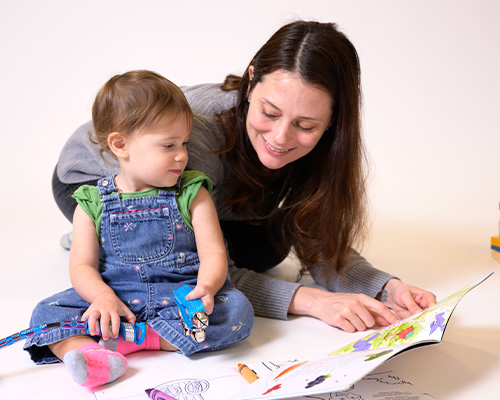
At 15 months, most children (75% or more) would be expected to:
- Stack at least two small objects, like blocks.
- Point to ask for something or to get help.
- Show you affection with hugs, cuddles or kisses.
At 18 months, most children (75% or more) would be expected to:
- Play with toys in a simple way, like pushing a toy car.
- Try to say three or more words besides “mama” or “dada.”
- Walk without holding on to anyone or anything.
- Climb on and off a couch or chair without help.
- Copy you doing chores, like sweeping with a broom.
Don’t be surprised if your toddler:
- Likes saying “No!”
- Is afraid of strangers.
- Follows simple directions but gets distracted easily.
- Gets into everything! You will spend a lot of time keeping her safe while she explores and learns about the world.
- Throws temper tantrums when tired, angry or frustrated.
2 Years Old
Your child is starting to become more familiar with different foods. At age 2, she will be:
- Much better at using a spoon and cup but will still make spills.
- Picky with food. This is normal and it may take as many as 15 tries for her to accept a new food.
- Playing with her food.
- Wanting to eat the same food at every meal. Be patient — this will pass. Don’t force your child to eat a food. Instead, continue to offer new foods with foods that she likes.
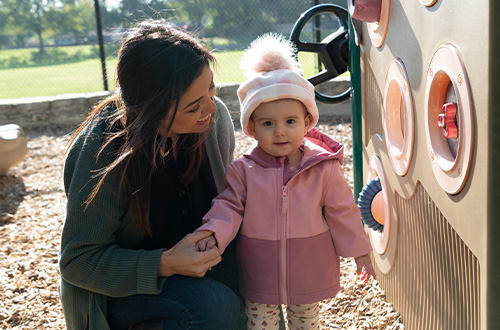
At 2 years, most children (75% or more) would be expected to:
- Play with more than one toy at the same time, like putting toy food on a toy plate.
- Walk, not climb, up a few stairs with or without help.
- Say at least two words together, like “more milk.”
- Use more gestures than just waving and pointing, like blowing a kiss or nodding yes.
- Point to at least two body parts when you ask her to show you.
At two and a half years, most children (75% or more) would be expected to:
- Show you what she can do by saying, “Look at me!”
- Name things in a book when you point and ask, “What is this?”
Don’t be surprised if your little helper:
- Uses the potty sometimes, but still has accidents. Remember to bring an extra pair of underwear when you go out.
- Cannot sit still for long.
- Doesn’t like to share!
- Shows defiant behavior, like not wanting to nap, but remember, she still needs rest and routines.
3 Years Old
Your child is probably feeding himself. At age 3, he will be:
- Eating with a spoon and fork. But that doesn’t mean he won’t make a mess!
- Choosing which foods he likes and creating food habits — keep offering him healthy choices!
- Interested in foods with different colors and shapes.
- Able to pour liquids from a small pitcher. He may spill a little or a lot!
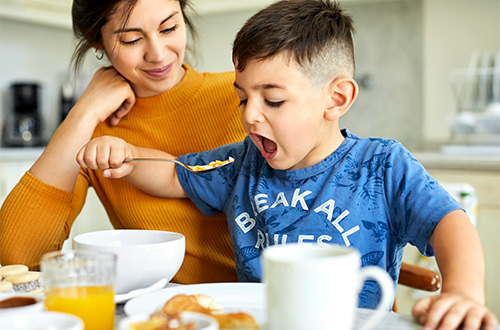
At 3 years, most children (75% or more) would be expected to:
- Put on some clothes by himself, like loose pants or a jacket.
- Talk with you in conversation using at least two back-and-forth exchanges.
- Notice other children and join them to play.
- Calm down within 10 minutes after you leave him, like at a child care drop off.
- String items together, like large beads or macaroni.
- Say first name when asked.
Don’t be surprised if your little copycat:
- Copies you when you sweep, mop or cook.
- Enjoys routines — and doesn’t like it when you change them!
- Likes to hear the same story over and over and over. Stay patient and keep reading!
4 Years Old
Your child is interested in where food comes from. She will be:
- Asking lots of questions — and enjoying family time during meals.
- Wanting to help you prepare foods.
- Hungry for three meals and one or two healthy snacks each day.
- Wanting to eat the same foods over and over. Keep offering her a variety of foods alongside the foods she already likes.
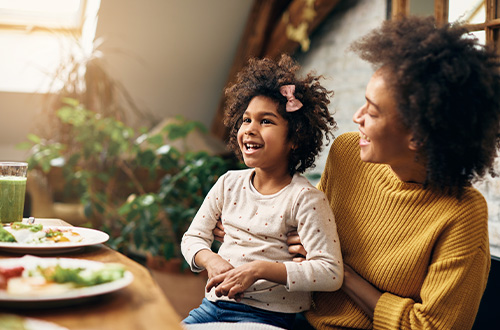
At 4 years, most children (75% or more) would be expected to:
- Catch a large ball most of the time.
- Draw a person with three or more body parts.
- Say sentences with four or more words.
- Say some words from a song, story or nursery rhyme.
- Name a few colors.
- Tell what comes next in a well-known story.
- Pretend to be something else during play, like a teacher, superhero or a dog.
- Ask to play with other children, like “Can I play with Alex?”
Don’t be surprised if your child:
- Is easily influenced by other kids and what she sees on TV and online. Watch with your child and limit screen time to one hour of high-quality programming per day for children 2 to 5 years old.
- Has an active imagination and gets scared easily, even by things that are “pretend” play.
- Is starting to show a preference for being left- or right-handed.
- Needs some help wiping, flushing and washing her hands after going to the potty.
5 Years Old
Your child is becoming more independent at this age. He will be:
- Able to eat with a fork and spoon and sometimes use a table knife.
- Able to make his own plate at mealtime.
- Influenced by what you and others are eating — good role modeling is important!
- Excited to help in the kitchen. He can help you rinse produce, stir ingredients and set the table.
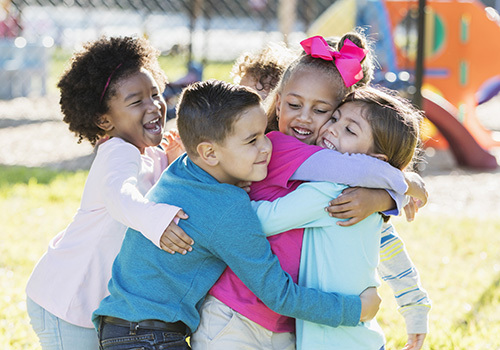
At 5 years, most children (75% or more) would be expected to:
- Follow rules or take turns when playing games with other children.
- Use words about time like “yesterday,” “tomorrow,” “morning” or “night.”
- Keep a conversation going with more than three back-and-forth exchanges.
- Name some numbers between 1 and 5 when you point to them and write some letters in his name.
- Do simple chores at home, like matching socks or clearing the table after eating.
- Button some buttons on clothing.
Don’t be surprised if your child:
- Displays a wider range of emotions — being cooperative sometimes and at other times very demanding.
- Shows independence by talking back to you. Try not to give a lot of attention to this. Instead, praise him when he asks for things nicely.
- Becomes more curious about certain interests. For example, if your child loves animals, visit a zoo, an animal shelter or your local park to observe birds and squirrels!
If you are concerned
If you are concerned about your child’s development, resources are available. You can get a free developmental evaluation to find out if your child is eligible for no-cost or low-cost services.
If your child is younger than 36 months:
Contact your local Early Childhood Intervention (ECI) provider at 877-787-8999 or through the Early Childhood Intervention website.
Read more about ECI on this Navigate Life Texas website for families.
If your child is 3 years or older:
Contact your local elementary school. Your child can get evaluated even if not enrolled in public school. Call any local public elementary school, even if your child doesn’t go to school there and say: “I have concerns about my child’s development and would like to have them evaluated through the school system.” Or visit Navigate Life Texas for more information on Early Childhood Special Education services.



 Have any questions?
Have any questions?
